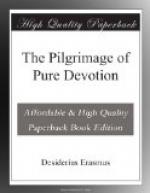examenynge althynges, dyd aske hym how many yeres
it was sythe that howsse was so sodenly broght thyther.
Many yeres agone saythe he. Yet, sayde I, the
wallys doo nat apere so old. He dyd nat denay
it. No mor thes woden || B v.|| pyleres.
He cowld nat denay but that they were sette there
nat longe agoo, and also the mater dyd playnly testyfye
ye same. Afterward, sayd I, thys roffe which
is all of rede dothe apere nat to be very olde, &
he granted also, thes greete bemes which lye ouerthwerte,
and these rafteres that hold vpe that howsse were
nat sett longe agone. He affyrmyd my saynge.
Well sayd I seynge that no parte of the housse is
lefte but all is new, how can yow say that this was
the house whiche was broght hyther so longe agoo. Me.
I pray you how dyd the howskeper, auoyde hymselffe
frome your argumet. Ogy. By & by he dyd shew
to vs the mater by the skyne of a bayre whiche had
hangyd be the rafteres a longe season, and dyd almost
moke the symplenes of owre wyttes that could nat perceyue
so manyfeste an argumete we beynge || perswadyd by
this argument, askid pardon of our ignorance, and
callid into our communycacyon the heuely mylke of
our lady. Me. O how like to the sone is the
mother, for he hath left to vs so moche blood here
in erthe, & she so moche mylke, that a man wyl skarysly
beleue a woman to haue so moche mylke of one chylde,
in case the chyld shuld sukke none at all. Ogy.
Thay saye the same of the holy crosse, whiche is shewyd
in so many places bothe openly, and pryuately, that
if ye fragmentes were gathered apon one heape, they
wold apere to be a iuste fraghte for a shipe, and
yet Christe dyd bere all his crosse hymselffe. Me.
But do nat you maruayll at this? Ogy. It may
welbe a strage thynge, but no maruayle, seynge that
the lord whiche dothe encreasse this at hys pleasure,
is almyghty. Me. It is very gently expownded,
but I am || afrayd, that many of thes be faynyd for
lukre. Ogy. I suppose that God wold nat suffre
hymselffe to be deludyd of suche a fasshion. Mene.
Yis, haue nat you sene that wha bothe the mother,
the sone, the father, and the holy ghoste hathe be
robbyd of thes sacrilegyous theues, that thay woldnat
ones moue, or styre nother with bekke or crakke wherby
thay myght fray away the theues. So great is the
gentles of God. Ogy. So it is, but here out
me tale. This mylke is kepyd apon the hye aultre,
and in the myddys ther is Christe, with his mother
apon hys ryght hand, for her honor sake, the mylke
dothe represente the mother. Me. It may be
sene than? Ogy. It is closyd in crystalle.
Me. It is moyste tha? Ogy. What tell
you me of moystenes, wha it was mylkyd more than a
thowsand and fyue hunthrithe yere agone, it is so
congelyd, that a ma wold || saye that it were chalke
temperyd with the whyte of a egge. Me. Ye, but
do thay sette it forthe bare? Ogy. No, lest
so holy mylke shuld be defowlyd with the kyssynge




